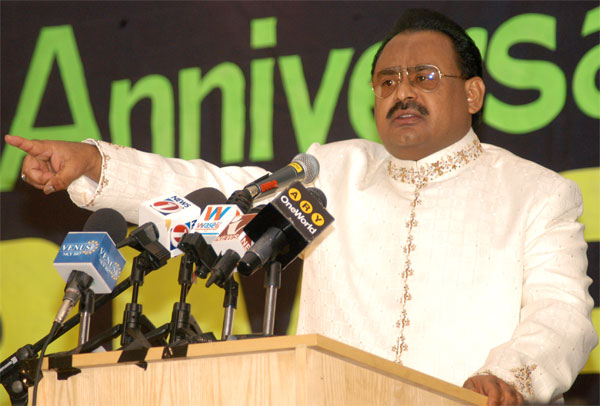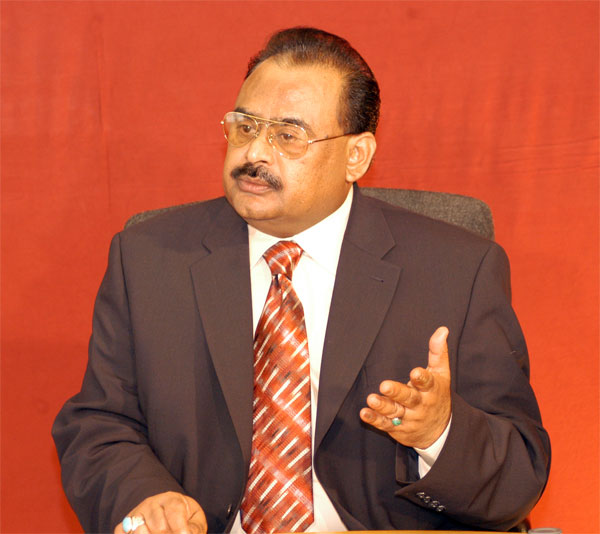Clashes Erupt in Pakistan's NW; Adm Mullen Makes Surprise Visit
At least 20 people were killed Saturday in fighting between security forces and pro-Taliban insurgents in volatile northwestern Pakistan, according to officials and witnesses.
The violence came during an unannounced, one-day visit to Pakistan by Adm. Michael Mullen, the Joint Chiefs of Staff chairman. Mullen met with President Pervez Musharraf; Pakistan's army chief, Gen. Ashfaq Kiyani; and other officials before returning to Washington.
During his meetings, Mullen expressed concern about insurgents flowing into Afghanistan from Pakistan, according to his spokesman.
The fighting Saturday began when insurgents attacked an army convoy near the town of Zargari in North-West Frontier Province, a region where the Taliban has gained strength in recent months. Witnesses said the insurgents fired rockets, grenades and automatic rifles at the security forces, who responded with heavy fire from ground artillery and helicopter gunships.
A local official, speaking on the condition of anonymity, said as many as 16 paramilitary soldiers were among the dead. Local officials said five insurgents were killed, but Taliban sources said one of their fighters had died.
Residents said four civilians were killed in indiscriminate fire from both sides.
"It is really sad that our whole town suddenly became a battleground between local Taliban and security forces, which has paralyzed life," said Mohammand Aurangzeb, a teacher.
Tensions have been high in the area since last week, when security forces arrested six Taliban fighters. In retaliation, insurgents attacked a police station and captured 29 people.
"We will release them only when the government frees our Taliban prisoners," Maulvi Omar, the spokesman for the Pakistani Taliban, said in an interview Friday. He threatened to kill the captives, who he said include soldiers, paramilitary forces and police.
Since coming to power in February elections, the government has been trying to negotiate with insurgents. But after months of failed talks, the government has moved troops into the restive regions.
Meanwhile, mortar fire from Afghanistan wounded several Pakistani soldiers Friday in the turbulent tribal area of South Waziristan. Pakistani Maj. Gen. Athar Abbas told the Associated Press it was unclear whether the fire came from NATO-led foreign forces or Afghan forces. He said Pakistani troops returned fire, and "casualties were reported on the other side."
The incident came a month after Pakistan reported that 11 soldiers were killed along the Afghan border when U.S.-led forces dropped more than a dozen bombs in and near Pakistan's tribal regions. At the time, U.S. and Pakistani officials indicated that the incident pointed to the need for better coordination.
Sunday, July 13, 2008
Hot Pursuit Into Pakistan?
War On Terror: As Washington moves an aircraft carrier off Pakistan's coast, U.S. commandos are reportedly poised to launch raids against terror targets inside Pakistan. It's about time.
It appears hawks within the Pentagon and CIA have won a long-running policy battle with risk-averse officials in the administration and diplomats at the State Department. The result is a more aggressive, go-it-alone policy in response to Pakistan's failure to disrupt terrorist training camps and cross-border attacks against our troops and the Afghan government.
Politics and diplomacy had not produced the desired results, and they've had ample opportunity to work. For nearly seven years now — as we've coaxed, cajoled and even bribed our "ally" with billions in aid — Osama bin Laden and his henchmen have remained hidden inside Pakistan's tribal areas. Patience with Islamabad has run out. It's time for unilateral military action.
The U.S. military confirms it is sending extra air power to the Afghanistan-Pakistan border by moving the aircraft carrier USS Abraham Lincoln from the Persian Gulf to the Gulf of Oman. The battle group ostensibly will provide air support for special forces who reportedly have been given the green light — after tumultuous debate within the White House — to conduct raids deep inside Pakistan's tribal belt to eradicate al-Qaida and Taliban bases.
According to a Houston Chronicle report, quoting both Democrat and Republican lawmakers who recently received a briefing from U.S. commanders in the region, the White House has authorized a secret plan to deploy commandos into Pakistan's tribal areas.
Islamabad's ineffective campaign makes it "imperative that U.S. forces be allowed to pursue the Taliban and al-Qaida in tribal areas inside Pakistan," said Rep. Michael McCaul, R-Texas. "If we don't do something now, they're going to strike us again (in the U.S.), and it is going to be out of this area."
His concern echoes that of the chairman of the Joint Chiefs of Staff, who recently returned from Islamabad warning that the next al-Qaida attack on America will originate from inside Pakistan if we can't convince our ally to stop cutting peace deals with our enemy and deny it safe haven.
At the same time, President Bush confirmed rumors he's authorized a troop escalation in the region in 2009. He didn't offer details, but Pentagon officials expect about 6,000 in reinforcements, raising U.S. troop presence in Afghanistan to about 40,000.
A military buildup along the border is critical to supporting special forces operations inside Pakistan, which would represent a major departure from previous policy respecting Islamabad's ban on such operations.
Of course, in concert with launching any covert raids into Pakistani territory, Washington will also have to ready a black ops team to help secure Islamabad's nuclear warheads so they don't fall into the wrong hands in the event of a political uprising.
What broke the long-standing bias within the administration against unilateral action? Several troubling developments, including:
• A 2006 peace deal brokered by Pakistani President Pervez Musharraf that has led to a 40% increase in the number of cross-border attacks from Pakistan's tribal belt, where insurgents now operate with impunity.
• U.S. intelligence reports showing al-Qaida's leadership has carved out a secure base inside the tribal area, along with a band of camps for training a new cadre of Western-looking terrorists to attack the U.S.
• Reports that the flow of foreign fighters and funding into the Pakistani border region from the Middle East has soared as jihadists relocate from Iraq.
• U.S. and Afghan intelligence showing evidence the Pakistani military is arming, training and sharing logistical data with Taliban insurgents to help them target U.S. and Afghan troops.
• A border incident last month in which Pakistani soldiers fired on U.S. forces.
• Evidence the Pakistani government may be behind a campaign to destabilize the U.S.-backed Afghan government, including assassination attempts on Afghan President Hamid Karzai.
• The bombing of the Indian embassy in Kabul, which killed 41 including Indian officials. Karzai has blamed Pakistan's military intelligence agency.
Pakistan's border area is a powder keg, and it seems that rather than trying to stabilize things,The Pakistani goverment is trying to light the fuse.U.S.military intervention is the only option left to control the region and put our enemy out of business.
It appears hawks within the Pentagon and CIA have won a long-running policy battle with risk-averse officials in the administration and diplomats at the State Department. The result is a more aggressive, go-it-alone policy in response to Pakistan's failure to disrupt terrorist training camps and cross-border attacks against our troops and the Afghan government.
Politics and diplomacy had not produced the desired results, and they've had ample opportunity to work. For nearly seven years now — as we've coaxed, cajoled and even bribed our "ally" with billions in aid — Osama bin Laden and his henchmen have remained hidden inside Pakistan's tribal areas. Patience with Islamabad has run out. It's time for unilateral military action.
The U.S. military confirms it is sending extra air power to the Afghanistan-Pakistan border by moving the aircraft carrier USS Abraham Lincoln from the Persian Gulf to the Gulf of Oman. The battle group ostensibly will provide air support for special forces who reportedly have been given the green light — after tumultuous debate within the White House — to conduct raids deep inside Pakistan's tribal belt to eradicate al-Qaida and Taliban bases.
According to a Houston Chronicle report, quoting both Democrat and Republican lawmakers who recently received a briefing from U.S. commanders in the region, the White House has authorized a secret plan to deploy commandos into Pakistan's tribal areas.
Islamabad's ineffective campaign makes it "imperative that U.S. forces be allowed to pursue the Taliban and al-Qaida in tribal areas inside Pakistan," said Rep. Michael McCaul, R-Texas. "If we don't do something now, they're going to strike us again (in the U.S.), and it is going to be out of this area."
His concern echoes that of the chairman of the Joint Chiefs of Staff, who recently returned from Islamabad warning that the next al-Qaida attack on America will originate from inside Pakistan if we can't convince our ally to stop cutting peace deals with our enemy and deny it safe haven.
At the same time, President Bush confirmed rumors he's authorized a troop escalation in the region in 2009. He didn't offer details, but Pentagon officials expect about 6,000 in reinforcements, raising U.S. troop presence in Afghanistan to about 40,000.
A military buildup along the border is critical to supporting special forces operations inside Pakistan, which would represent a major departure from previous policy respecting Islamabad's ban on such operations.
Of course, in concert with launching any covert raids into Pakistani territory, Washington will also have to ready a black ops team to help secure Islamabad's nuclear warheads so they don't fall into the wrong hands in the event of a political uprising.
What broke the long-standing bias within the administration against unilateral action? Several troubling developments, including:
• A 2006 peace deal brokered by Pakistani President Pervez Musharraf that has led to a 40% increase in the number of cross-border attacks from Pakistan's tribal belt, where insurgents now operate with impunity.
• U.S. intelligence reports showing al-Qaida's leadership has carved out a secure base inside the tribal area, along with a band of camps for training a new cadre of Western-looking terrorists to attack the U.S.
• Reports that the flow of foreign fighters and funding into the Pakistani border region from the Middle East has soared as jihadists relocate from Iraq.
• U.S. and Afghan intelligence showing evidence the Pakistani military is arming, training and sharing logistical data with Taliban insurgents to help them target U.S. and Afghan troops.
• A border incident last month in which Pakistani soldiers fired on U.S. forces.
• Evidence the Pakistani government may be behind a campaign to destabilize the U.S.-backed Afghan government, including assassination attempts on Afghan President Hamid Karzai.
• The bombing of the Indian embassy in Kabul, which killed 41 including Indian officials. Karzai has blamed Pakistan's military intelligence agency.
Pakistan's border area is a powder keg, and it seems that rather than trying to stabilize things,The Pakistani goverment is trying to light the fuse.U.S.military intervention is the only option left to control the region and put our enemy out of business.
Labels:
Militants,
Pakistan,
Tablibanising,
Taliban,
Terrorism,
Tribal areas,
War on Terror
US Ask Pakistan to get tough with militants

Amidst growing fears of a unilateral American action against ‘terrorist sanctuaries’ in tribal areas, US Joint Chiefs of Staff Chairman Admiral Mike Mullen made an unscheduled visit to Islamabad on Saturday and met top military leadership of the country to persuade it to “act decisively” against Taliban and Al Qaeda militants suspected of mounting cross-border attacks in Afghanistan.
Sources said that the United States was “deeply frustrated” with Pakistan’s lack of ability or willingness, or both, to move decisively to end the rising infiltration by the Taliban militants into Afghanistan.
Recent reports in the Washington Post and New York Times claimed that the US administration was considering using direct military force to stop the infiltration and it may use commando forces, besides direct missile attacks, on militants’ targets.
“Admiral Mullen was here on a day’s visit and has already left,” US embassy spokesperson Kay Mayfield told Dawn, but would not say anything about his meetings.
During his brief stay, Admiral Mullen met the Chief of Army Staff, Gen Ashfaq Parvez Kayani, and Chairman of Joint Chiefs of Staff Committee, Gen Tariq Majeed, and discussed with them the latest situation in Afghanistan and joint efforts to deal with the challenge posed by terrorists in Fata.
Pakistan army spokesman Maj-Gen Athar Abbas would neither confirm nor deny the meeting, saying no meeting between Admiral Mullen and the Chief of the Army Staff was scheduled.
The sources said that Mullen conveyed to Pakistan military leaders the US government’s growing frustration over Pakistan’s ‘inaction’ against Taliban militants in tribal areas.
Admiral Mullen reiterated Washinton’s stance that these safe havens of the militants should be eliminated, emphasising that Pakistan’s peace deals with terrorists were not achieving the desired results of isolating them and were rather aggravating the problem.
The sources quoted Mullen as complaining that militants were moving across the border with greater liberty now than during the previous government. This was Mullen’s fourth visit to Islamabad this year. But, contrary to his previous visits, this visit was kept in low profile and no official announcement was made.
The United States, in a clear shift in its military strategy in Afghanistan, has stopped sharing information with Pakistan regarding action against terrorists in tribal areas.
During the meeting, Gen Kayani is reported to have protested at recent attacks in Angoor Adda and Mohmand Agency in which Pakistani troops were killed and injured.
The army chief recalled Pakistan’s sacrifices in the war on terror and pledged that Pakistan’s resolve against terrorism remained firm. The Chief of the Army Staff, the sources said, asked the US admiral to share actionable intelligence against terrorists with the Pakistan army.
Earlier this week, Mullen had told reporters in Kabul that Pakistan’s government needed to crack down on Taliban and Al Qaeda militants in Fata.
Subscribe to:
Comments (Atom)




